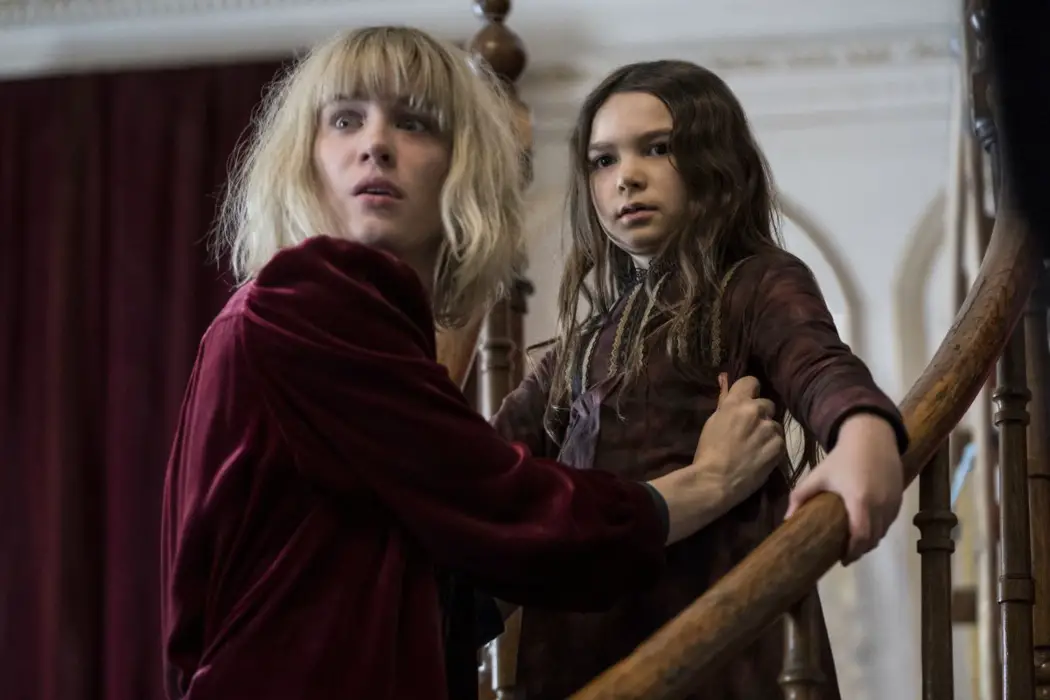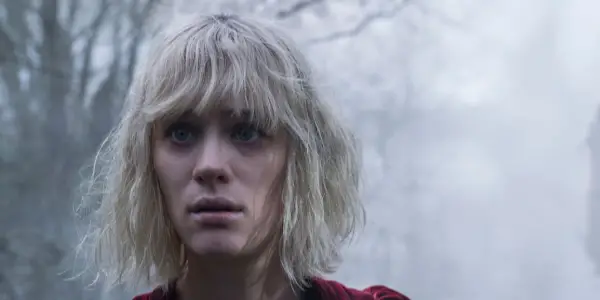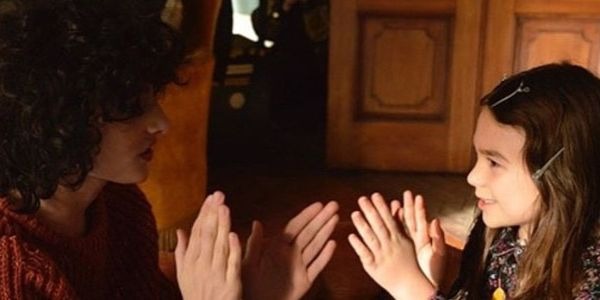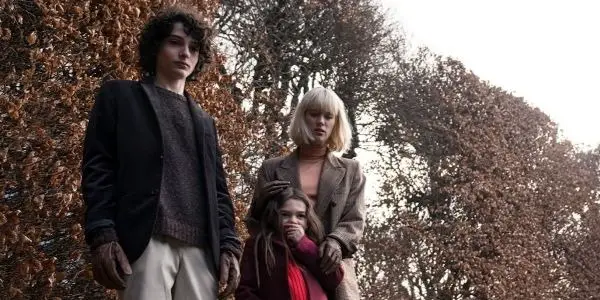THE TURNING: A Scary Amount Of Wasted Potential

Lana Stanczak is a student at Columbia College Chicago, majoring…
Near the beginning of The Turning, when Mackenzie Davis pulls up to her new job at a mansion, she says “This can’t be real.” About 20 minutes later, one might say the same thing about the very film they’re watching.
The Turning, directed by Floria Sigismondi, is a retelling of the 1898 horror novella “The Turn of the Screw” by Henry James. Davis stars as Kate, a teacher who is hired as a live-in tutor for two siblings (Brooklynn Prince and Finn Wolfhard) whose parents died in a tragic accident. Soon after arriving, Kate begins to encounter strange phenomena surrounding the family’s history. Although those involved are talented, the film suffers from a poor script and tedious pacing.
Horrifically Dull
One of the most important parts of horror is the suspense. The Turning has none. Scenes that are meant to build tension go on for what, at times, feels like 10 minutes. Often, these scenes lead to absolutely nothing. There is a scene where Kate wanders around the grounds, looking for her new employers. It goes on for so long, and leads to a silly gag where she is scared by a horse. This type of scene happens several times, and adds nothing to the mystery. They make a movie that is about 95 minutes feel over 2 hours long. To combat this, the filmmakers must have figured that jump scares would do the trick. But when there is a jump scare every 5 minutes, it isn’t effective at all.

At the beginning, it is set up that Kate’s mother is unstable, and has lived in a mental institution for a long time. There comes a time when the plot is very reliant on this. The problem is, it hasn’t been brought up in an hour, so it’s completely absent from the mind. The entire film is full of curious ideas that have no reason to be there. For example, Wolfhard‘s Miles has a thing for spiders. Why? The movie never answers that. All it does is create a semi-interesting visual, and that is not enough to make the film itself interesting.
One of the most puzzling parts of the film is the relationship between Kate and Miles. It’s explained that Miles was once close to a former employee at the home, who introduced him to drinking and perhaps influenced him to act inappropriately with women. There are times when it seems that Miles is creepily into Kate, like when he whispers that her tattoo is sexy. But other times, he can’t stand her. This is supposed to be unsettling, of course. But Davis is 32 and Wolfhard is 17, which makes it unsettling on a completely different and perplexing level.
A Questionable Script
The script was written by Chad and Carey Hayes, who have received acclaim for writing the horror hit The Conjuring. The same acclaim cannot be applied to the script for The Turning. From the very first scene, the dialogue is full of exposition. It feels as though the audience is being spoon-fed information that easily could have been shown. There are also lines that are so comically bad (“Stop now. Stop telling tales!”) that it’s hard to believe the script was written by people with as big of a resume as the Hayes brothers have. The cutesy rapport that is thrown in every so often between the kids and Kate actually makes them seem more robotic than relatable.

Although the film is advertised as a “modern” retelling, it’s actually set in the 1990s. But you’d be hard pressed to figure that out were it not for the first scene in which a newscaster announces a memorial service for Kurt Cobain. The film also tries to tie in his suicide several times, as sort of a weight hanging over the people of Kate’s generation. But that came off as insensitive. There didn’t seem to be any other reason to set the movie outside of modern day, besides being able to dress Davis in Doc Martens and have Miles listen to loud grunge music to add to his “edgy teen” persona.
The dull dialogue with the already dull pacing only makes the film drag more. In one scene, Kate tearfully calls her old roommate from a payphone after her friction with the two children reaches a boiling point. This was a scene meant to humanize Kate. But because her monologue was so disengaging, I found myself watching her mouth and wondering why no one gave Davis chapstick before filming the scene.
Missed Potential
The story The Turning is based on is the epitome of gothic literature. And the film does capture that visually. The house in which most of the story takes place is a stunning gothic mansion that’s both off-putting and appealing. The color scheme of the movie also captures that imagery; the whole movie looks like it was shot in a grey filter that Edgar Allen Poe would adore. However, the visuals seem to be the only aspects of the source material they really embraced.

The three main actors in the film have proven their strengths in other projects, so it’s unfortunate to see them in something so below their talent level. Davis suffers most from this, being an actual adult, and ends up sounding like a stilted high school drama student. Nevertheless, she’s good enough to keep people awake, and there’s no question she can carry a film on her own. Prince, who wowed audiences in The Florida Project, deserved a much better movie as her follow up. She’s barely given anything to do besides run around and scream; the expected creepy kid trope was mostly relegated to Wolfhard. Speaking of which, this and his last film The Goldfinch have not worked out the way he probably expected, but as long as he’s cast in well-written movies in the future, he’ll be ok.
The Turning: Conclusion
The last few years have come with a slew of fantastic horror films, and unfortunately The Turning does not fall into that category. With a substance less story, it isn’t something that will be remembered. By the end of the film it was unclear what really happened, and there was no motivation to figure it out.
What did you think of The Turning? Let us know in the comments!
The Turning was released in theaters in the US and UK on January 24, 2020. For all international release dates, see here.
Does content like this matter to you?
Become a Member and support film journalism. Unlock access to all of Film Inquiry`s great articles. Join a community of like-minded readers who are passionate about cinema - get access to our private members Network, give back to independent filmmakers, and more.
Lana Stanczak is a student at Columbia College Chicago, majoring in Creative Writing with a concentration in non-fiction. Her taste in film is very diverse, and some of her favorites include Singin' In The Rain, Ex Machina, Heathers, and Ghostbusters.













